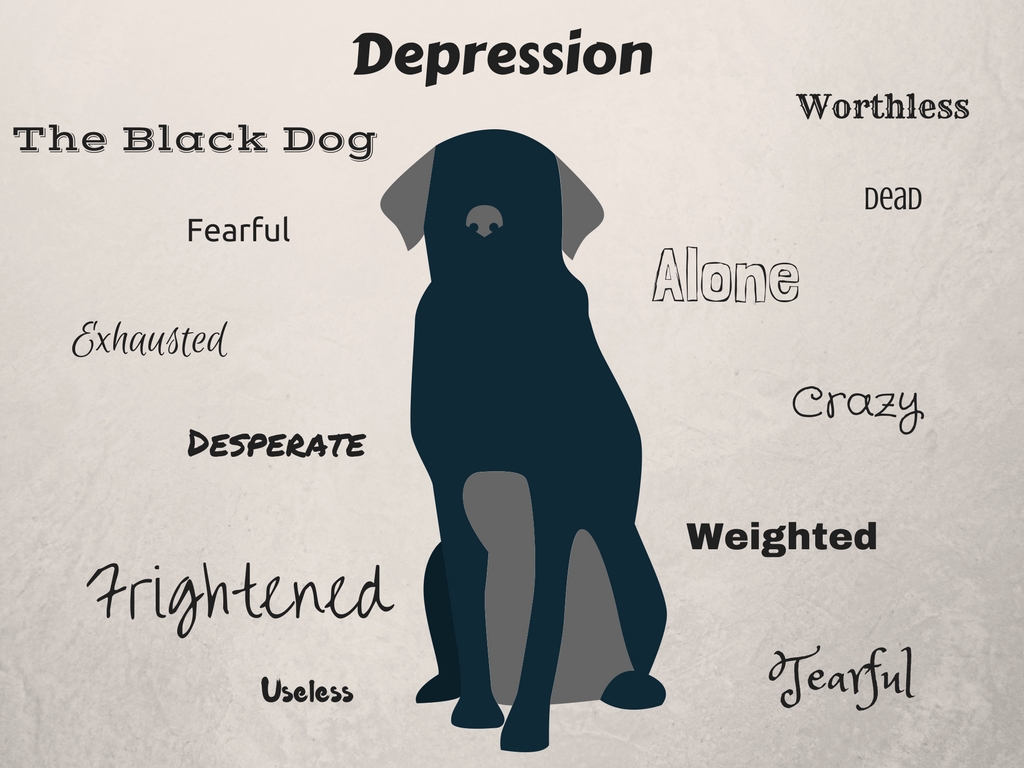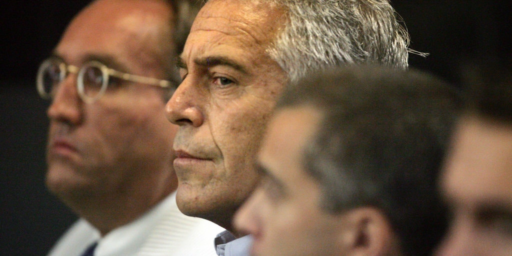U.S. Suicide Rates Soaring
There are twice as many suicides as homicides in America.

Apropos this morning’s news about Anthony Bourdain and Tuesday’s of Kate Spade . . .
NYT (“Defying Prevention Efforts, Suicide Rates Are Climbing Across the Nation“):
Suicide rates rose steadily in nearly every state from 1999 to 2016, increasing 25 percent nationally, the Centers for Disease Control and Prevention reported on Thursday. In 2016, there were more than twice as many suicides as homicides.
[…]
The new analysis found that nearly 45,000 Americans aged 10 or older died by their own hand in 2016. The increase varied widely by state, from a low of 6 percent in Delaware to more than 57 percent in North Dakota. The rate declined in just one state, Nevada, where it has historically been higher than average.
Social isolation, lack of mental health treatment, drug and alcohol abuse and gun ownership are among the factors that contribute to suicide.
Suicide is the tenth leading cause of death in the United States, and one of three that is increasing. The other two are Alzheimer’s disease and drug overdose, in part because of the spike in opioid deaths, said Dr. Anne Schuchat, principal deputy director of the C.D.C.
Firearms were by far the leading method, accounting for about half of suicides. That number has remained steady over recent decades, she said.
Suicide rates varied from 6.9 per 100,000 residents a year in the District of Columbia to 29.2 per 100,000 in Montana.
Prevention efforts have been elusive:
The analysis found that slightly more than half of people who had committed suicide did not have any known mental health condition. But other problems — such as the loss of a relationship, financial setbacks, substance abuse and eviction — were common precursors, both among those who had a mental health diagnosis and those who did not.
Other studies have found much higher rates of mental health disorders among people at high risk of suicide, experts noted.
“The reason most suicide decedents don’t have a known mental disorder is that they were never diagnosed, not that they didn’t have one,” said Dr. David Brent, a professor of psychiatry at the University of Pittsburgh.
The relationship with firearms is obvious:
Access to guns can make it more likely that an impulsive or intoxicated person will attempt suicide even if he or she has no clear mental health problem, Dr. Brent added.
Public misperceptions abound:
“We have worked really hard to explain to the public that suicide is not simply a matter of too much stress, but that it involves the identification and treatment of mental disorders as one important component,” he said.
Bourdain was very much in the high-risk group; Spade, not so much:
The C.D.C. found that men accounted for three-quarters of all suicides, and women one-quarter. The numbers were highest among non-Hispanic whites, and among those aged 45 to 65 years old.
Externalities matter:
Previous C.D.C. reports have found rate increases of 80 percent among white, middle-aged women since 1999, and of 89 percent among Native Americans. The rates declined slightly among black men and people over age 75 during that time.
Suicide rates have waxed and waned over the country’s history and tend to reach highs in hard times. In 1932, during the Great Depression, the rate was 22 per 100,000, among the highest in modern history. The rate in the new C.D.C. data was 15.4 per 100,000.
The past three decades have presented a morbid puzzle. Rates have risen steadily in most age and ethnic groups, even as rates of psychiatric treatment and diagnosis have also greatly increased.
The reasons are many, experts said. The biggest increases have been in states like Oklahoma, Montana and Wyoming where gun ownership, drug use and economic hardship are common. Among middle-aged people across the country, marriage rates have declined, and social isolation has increased.
Back to the prevention issue:
Prevention has been elusive, in part because doctors have not had programs that reliably reduce suicide rates. Crisis hotlines can save lives; so can psychiatric treatment. But suicide is such an unpredictable, often impulsive act that no single intervention has proved sufficient.
“A big problem that has not yet been addressed in practice is that we continue to rely almost entirely on people themselves to proactively tell us if they are suicidal,” said Matthew Nock, a professor of psychology at Harvard University.
Yet research has shown that nearly 80 percent of people who die by suicide explicitly deny suicidal thoughts or intentions in their last communications, he added.
In addition to being sad in that it means these people aren’t getting the help they needed, those left behind are racked with guilt thinking they should have known.





I’ve always disagreed with the notion that suicide is “often impulsive.” Sometimes it is; among teenagers, it may be “often,” as they have little impulse control. But many adults meticulously plan their suicides, or at least consider it for a long time before actually taking action.
It only appears to be an impulsive decision because the victim made sure to keep their real feelings secret. I know I did. I never admitted to feeling suicidal, ever, because I didn’t want to get locked up. I was depressed; I wasn’t stupid.
Consider this: Many addicts keep their addictions secret for years, sometimes decades. They learn ways to keep the people in their lives in the dark. Depressed/suicidal people do the same thing.
I have a suspicion that we should be looking harder at low testosterone. Look at the gender – male. Look at the prime ages – late middle age, when T drops naturally. Look, too, I suspect at low work-force participation rates.
You take a man who has defined himself all his life as virile, strong, productive, cut his testosterone and thus his sex drive and take him out of the work force at just the point in life when he’s forced to face his own mortality and admit his own failures and limitations, and you certainly create a fertile field for suicidal thoughts.
I never believe in single-bullet theories, but the symptoms of low-T and depression can be hard to differentiate. There are almost certainly many contributing factors, and those factors won’t be universal, but I suspect testosterone plays a big part.
@michael reynolds: American women take more psychoactive drugs than any other group in the world. Either they’re uniquely disposed to popping pills or they’re subject to enormous pressures. I think it likely a social problem exists that is affecting all demographics.
You’re not a doctor, Michael. I’m not a doctor. Or mental health professionals. But you add in other physical concessions to advancing age and intuitively I think there is a lot to what you say. It may also have a lot to do with power seeking.
An interesting question is: what makes one man don a tee shirt and shorts everyday and smoke pot in the Keys, and what makes another continue to accumulate power and wealth?
This is not an entirely unsnarky question, but is this what the end of white privilege looks like?
…is this what the end of white privilege looks like?
Maybe it is a measure of what it is worth.
I would tie it to the decline of the middle class — there are t enough good paying jobs for unskilled and semi-skilled labor anymore.
People identify themselves through their work.
I also wonder about the dramatic reduction in drunk driving — a formerly much more common, stupid, self-destructive behavior that might have stopped people earlier.
@Mister Bluster:
What’s that supposed to mean?
I’ve been arguing for at least the last two years with people who are completely indifferent to the suffering of white men because they have some warped theories about social justice. So I guess I’m just asking whether the rising suicide rates are a feature or a bug?
Sounds like you’re leaning towards feature.
@Gustopher :
Which might help explain the lower prevalence of female suicides. Think of how a man typically answers vs a woman when asked “Who are you?”. The man will tell you their profession, women usually answer with their familial connections. For instance you hear Bob say “I’m a doctor” vs Pam saying “A mother of 3”. When was the last time you heard a guy immediately identify as a dad or husband rather then by their job? A lot of that is socialization and support structures. Culture’s trained women to think in terms of their bonds (sister, daughter, wife, mother then career) so they’re less likely to suffer that loss of identity. Think about Rose McGowan’s reaction ( “Asia needed you, Anthony”) and how she cited bonds as a reason to reach out for help.
We all have our crosses to bear.
WICHITA, Kan. – A woman who led an investigator to the decomposing remains of her 5-year-old stepson three months after reporting him missing was found dead early Friday in a Wichita home with three suicide notes and a rifle at her feet, police said.
@James Pearce:
Jesus, James get off your high horse and actually read the article. Yes, 3/4 are men but those numbers are changing.
My sister is one of those people. We had to put her on a psych hold because she threaten to throw herself in the river then drove off to do it. We searched for hours before we found her and had to take her by force to the hospital. By the grace of God, she’s still here and seeking help. It’s not belittling to any white male anywhere to point out that this problem is increasing for everybody. After all, Kate Spade did this a few days before Bourdain and you weren’t making snarky commentary on white privilege then.
A tragedy is a tragedy. Can we focus on getting EVERYONE help if they need it instead of making this political again?
Men, especially older men, often have weak-to-nonexistent social support networks, or in technical jargon terms, “friends”. Women tend to have more. Cultures where older people have more robust social networks have fewer suicides, as well as fewer problems with drugs/alcohol.
Suicide rates of teenagers alone jumped a whopping 31% between 2010 and 2015. From the people studying this phenomena, there’s apparently an excellent correlation between that rise and their use of smartphones and social apps.
I don’t know if it’s as applicable as adults, but my personal name for Facebook is “Depression Central”. I go there to keep in touch with distant friends and relatives and come away thinking everybody is doing cooler stuff than me.
@KM:
Jesus, KM, I was just asking a question.
Sure, but in order to focus on getting EVERYONE the necessary help we’ll have to abandon all that social justice rhetoric that says white dudes are privileged.
@Guarneri:
Apropos of a novel I’m working on I’ve been reading about the Dutch. There’s something about them that stands out, a quiet, non-confrontational, non-hubristic confidence. Part of it is their unique history, part of it is the fact that alone among nations, they actually created their country out of water and mud. But there was an interesting vignette about an 18th century Dutch woman scrubbing her stoop which the observer points out was already spotless, and surrounded entirely by equally spotless streets. The observer notes that there is no sense of obligation evident and concludes that this habit of industrious cleanliness is so deep that it has become core character.
I don’t know about you, but I work because I work, because what I do is work. I’ve held a full-time job since I was 16. WTF else would I do? Fish? By now it’s core character.
@James Pearce :
Ines, sister of Queen Máxima of the Netherlands, just committed suicide as well. Privileged people kill themselves too. As we’ve learned this week, money and fame can’t save from depression.
Pretending that white males don’t have the best of a bad lot in this world isn’t going to change that they’re dying. Understanding that you got lucky in the genetic lottery with society’s preferred combo won’t change that. Acknowledging that somebody else will experience extra difficulty on top of the already stressful life due to nothing but their skin, their gender or their sexuality doesn’t change that. America is privileged in regards to most of the world with things we hardly think about that are blessings to others and our suicide rate is astronomical.
Privilege =/= protection from the pitfalls of life. It just means you’re highly unlikely to run into certain kinds.
@James Pearce:..Jesus, KM, I was just asking a question.
@Mister Bluster:
What’s that supposed to mean?
Jesus, Pearce, I was just asking a question.
I’m already regretting this, but I’m going to offer some personal experiences on this subject.
Another factor, of all things, is improvements in medical technology. Conditions that used to kill now can be managed — but at a price.
Twenty-odd years ago, I nearly died when I developed one of those conditions. I was told that it was “manageable.” Then I found out what “manageable” meant — it’s incurable, but with medication and serious limitations on my life choices, they could slow down how fast it would cripple, then kill me.
Almost five years ago, I nearly died again. I was told that I now had a second, unrelated condition that was also “manageable.” And once again, that meant that, with more medications and more serious limitations on my activities, I can slow down how fast this new one will cripple, then kill me.
Three weeks ago, I nearly died a third time. The medical experts (and I’m very lucky to have access to some very good medical experts) are unsure of just why I had that particular incident, but one strong possibility is that I’ve developed a third condition that can be “managed.” It’ll just take even more medications and even more limitations on things I can do. In a couple of weeks they’ll tell me if I likely have that new, third condition, or if my episode was just a one-off.
Years ago, at least one of these conditions would have killed me. But thanks to the advances in medical technology, I can live on.
I’m just rapidly approaching the point where I start weighing the “quality vs. quantity” arguments about life.
I think a big factor has to be our ongoing social fragmentation. We belong less to communities, less to our neighborhoods, even less to our families. We lack the support networks needed to get us through tough times. And we have an attitude that you should just be able to “gut it out” and that depression or feelings of helplessness make you weak.
I looked at what’s going on in other countries and suicide rates seem to be mostly steady or falling. In the UK, for example, it’s fallen 10% over the same time period of the CDC study. It has fallen in France. Fallen in Germany. Even fallen in Japan. This appears to be a public health crisis; and probably not a million miles away from the reason for the opioid epidemic.
@Warren Weber: “I’m just rapidly approaching the point where I start weighing the “quality vs. quantity” arguments about life”
Perhaps the quality would be higher if you stopped using your time deliberately annoying people, Little J@nos.
It’s amazing that someone would use multiple aliases, yet with each alias, share information pointing out who he really is–the same person behind the original alias…well, this is a post that deals with mental health issues…
@An Interested Party: Almost as amazing as how many people will get so obsessed with someone they hate and despise and can’t stand, and will put so much time and energy into that person…
While insisting that they aren’t the haters, they aren’t the intolerant ones.
You really need someone to hate, don’t you? You have people like Trump to hate in the abstract, but you just completely blow your wad when a real, live person shows up so you can all gang up and show how superior you all are.
Besides, why should I worry about getting doxxed by the commentariat here? Why would you do that? Not only is that against the rules of this site, it’s a truly loathsome and despicable act, and the sorts of people here would never stoop so low, would they?
@An Interested Party: Here, I’ll demonstrate my faith in the moral superiority by actually offering a sliver of specific personal information. The health issues I alluded to were all physical, not mental.
And if you’re going to have your very first tonic-clonic seizure (formerly known as a “grand mal seizure”), there are few better places to have it than “in the pre-operative suite of a major teaching hospital, three minutes before getting general anaesthesia.”
Not having it at all, of course, is the best option. But that wasn’t in the cards.
@Warren Weber:
As someone who’s recently dealt with a family member in that same boat, I sympathize. It’s a hard decision to make and one our culture doesn’t like talking about. Life is more then just existing.
While I cannot presume to know your circumstances, your feelings or even you as a person, I would offer my opinion to consult with someone and speak with your loved ones. You are not obligated to live for anyone other then yourself and it’s not right to use guilt to keep someone here who’d rather go. Still the pain of losing someone to a death by their own hand is terrible and long-lasting and I wouldn’t wish it on anyone. Talk to someone please so they don’t get a new pain if you decide yours must stop.
Commentary tiffs aside, you’re still a person and I’m willing to listen if you need an ear.
@Hal_10000 :
Rugged individualism kills when applied to mental health.
Indeed…like being banned from this site and returning to it again and again using a variety of aliases…that’s pretty low…
@KM:
And even more to the point, there are many kinds of privilege.
White privilege definitely exists, as does male privilege. But both are less important than able-privilege (I’m not white, but I think I’m far more privileged than a white male with say MS or ALS, or who is paraplegic or quadriplegic etc). Financial privilege is also more important than race (as engineers love to do, I take limiting factors – is the richest indigenous person privileged compared to a white street person – I’d say yes … having your basic physical necessities of food and warmth met is the ultimate privilege). Education privilege is also very important. As is attractiveness privilege – I wonder why people never notice this one. Attractive people of all races get privileges that few unattractive people get.
The point being that just because someone has white male privilege doesn’t mean they’re privileged in terms of health or finances etc. Pearce’s mistake is thinking there is only one kind of important privilege (being white) so he assumes that white males committing suicide means that privilege doesn’t exist. The reality is that many other kinds of privilege exist, some of which are overwhelming (health especially – I can’t imagine living like say Stephen Hawkings). White privilege exists, and suicide of white males doesn’t negate it, it just shows there are other kinds of privilege as well.
@george:
Very cogently explained. I dislike single bullet theories, it’s almost always ‘all of the above,’ life is complicated. We’re dealt different hands, and it’s not that being white means you get three aces in the first deal, but it’s a pair of deuces, and that’s an edge. Doesn’t mean life is easy, it’s just that there’s one way in which you are guaranteed to have an edge. I wish white people would be less defensive about it: it is what it is, there’s no point arguing over facts. And I wish white people who position themselves as vociferous spokesmen for black people, would recognize that ‘privilege’ is not some grand unifying theory.
From where I sit the fact that I’ve made it almost 64 years without a serious heath issue is the best. I’d thank God for that if I believed in him. Such a cliché: if you have your health. . .
@michael reynolds:
I understand. I, too, have worked since I had a drivers license. And all spring breaks, and most of Christmas break and probably since two days after I graduated yada yada. I’m not sure that’s really healthy, though.
I’m now facing the fact that we have only three companies left in portfolio. In probably two years they will be sold. Then what? The administrative fund wind up stuff is just crap. Not the same. Do you do volunteer work? Consult? Sit on boards where you can’t really have a lot of influence? Re-engage with people you lost touch with after all those years of 70-80 hr work weeks? Or do you just travel and drive the handicap back down to 3?
There are a lot of Jimmy Buffet wannabes down here. I just think I’ve got too much of a depression era mentality. But I can tell you, I see an awful lot of people who seem to just be rudderless and waiting around to die.
@george:
I think my big mistake is allowing myself to resent a lot of the social justice rhetoric about white males. It may seem like it comes from solidarity with “my people,” or perhaps even ego, but no, it’s a principled belief that racism is stupid, that the measure of a man cannot be taken by looking at his skin color or ancestry.
If a soaring suicide rate is a social problem in need of a solution, we’re going to need pretty good ideas, and ideas like “this group has too much privilege” have no place in the discussion.
@Guarneri:
My plan for retirement (I won’t ever really retire) is to buy a food truck, find a nice beach or interesting city corner to park it, and serve boeuf bourguignon, crusty French bread and red wine. Maybe a cassoulet. And creme caramel. That’s it, and no special requests. It would be amusing to park it near a major publisher’s office so that I can be a cautionary tale and people can say, “See that guy with the ladle? He used to be somebody.”